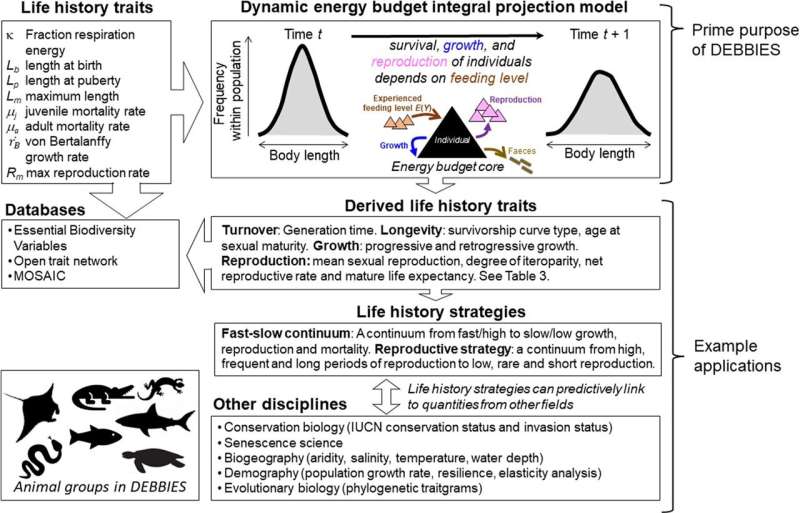This article has been reviewed according to Science X's editorial process and policies. Editors have highlighted the following attributes while ensuring the content's credibility:
fact-checked
trusted source
proofread
Helping predict cold-blooded animals' response to environmental shifts

Newcastle University researchers have developed a new tool to predict cold-blooded animals' responses to environmental change.
In the face of rapid and extreme environmental changes, predicting how animals respond has become a critical challenge. A Newcastle University team of scientists and students have created the DEBBIES dataset, offering a unique resource to enhance our understanding of cold-blooded animals' responses to novel environmental shifts.
Published in Scientific Data, the study highlights the potential of the DEBBIES dataset to generate advanced models capable of predicting animal responses to these unprecedented changes. For biologists, this dataset unlocks the ability to develop general predictions on cold-blooded animals' responses using only a few key characteristics.
The DEBBIES dataset contains estimates of eight life history traits (length at birth, puberty and maximum length, maximum reproduction rate, fraction energy allocated to respiration versus reproduction, von Bertalanffy growth rate, mortality rates) for 185 ectotherm species.
It offers versatility to support the work of users, such as researchers or students. DEBBIES is ideally suited to create population forecasts to novel conditions, like those created by climate change.
Study lead author Dr. Isabel Smallegange, Senior Lecturer in Population Biology at Newcastle University's School of Natural and Environmental Sciences, said, "Traditional models for predicting animal responses to environmental change rely on phenomenological descriptions of survival, growth, and reproduction. But because these models lack a mechanistic underpinning, they face limitations in adapting to the increasingly rapid and extreme alterations in our environment.
"The DEBBIES dataset addresses this challenge by providing a wealth of characteristics for cold-blooded animals, including sharks, skates, rays, crocodiles, lizards, sea turtles, and more.
"The dataset not only facilitates state-of-the-art modeling but also emphasizes the collaborative efforts of undergraduate and postgraduate students who have contributed significantly to its development."
Study author, Sol Lucas, a Ph.D. researcher at Newcastle University's School of Natural and Environmental Sciences, added, "I contributed data to DEBBIES as part of my Ph.D. We are using the data to map out life history strategies of sharks, skates and rays, as well as predicting population growth rates and their resilience to bounce back from population declines.
"I'm excited to see how data sourced in my project can be used by others to answer questions about these magnificent cold-blooded species and their responses to a rapidly changing world."
Cold-blooded animals account for 99% of Earth's species. Building on this research, the authors will expand the dataset and will continue adding new species.
More information: Isabel M. Smallegange et al, DEBBIES Dataset to study Life Histories across Ectotherms, Scientific Data (2024). DOI: 10.1038/s41597-024-02986-x
Provided by Newcastle University

















